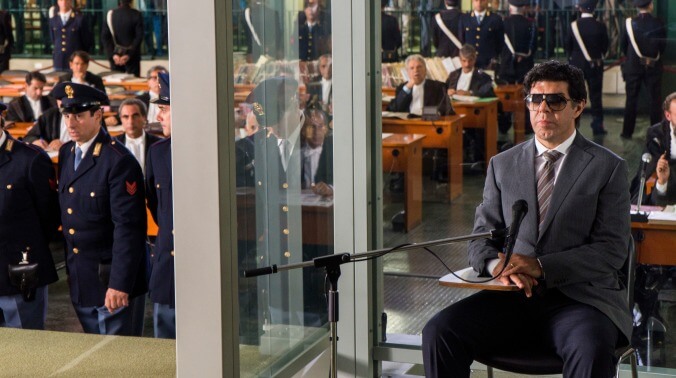Mob movies usually foreground the concept of honor among thieves. In this world, you can lie, cheat, steal, and sometimes even kill with impunity, but spill one word to the authorities and you’re forever a rat—the lowest, most irredeemable scumbag who ever was or could be. As a defense attorney sneers at Henry Hill toward the end of Goodfellas, “People call them rats because a rat will do anything to survive.” Such courtroom scenes, in which the protagonist finally turns state’s evidence and gives up his friends, virtually always take place in the final reel, after we’ve spent a couple of hours enjoying the vicarious thrill of transgression. Who wants to spend an entire film in the company of—as Hill memorably puts it—a schnook?
Marco Bellocchio, that’s who. One of Italy’s most revered directors—his 1965 feature debut, Fists In The Pocket, was recently issued by Criterion—Bellocchio has built his latest film, The Traitor, entirely around Tommaso Buscetta, the Sicilian Mafia’s most infamous rat (or its most societally productive ex-member, depending upon one’s point of view). After several members of his family were killed during the second Mafia war of the early ’80s, Buscetta (embodied onscreen with pugnacious verve by Pierfrancesco Favino) chose to spill his guts to Italy’s primary anti-Mafia judge, Giovanni Falcone (Fausto Russo Alesi). And that’s the movie, basically. It’s about 20 years’ worth of Buscetta living in witness protection, explaining the Cosa Nostra’s inner workings to the cops, and repeatedly testifying in court against former associates, who, despite being on trial for their lives, make no attempt to disguise their white-hot anger at this smug stoolie.
It’s an odd subject for Bellocchio, whose recent work (Vincere, Blood Of My Blood) has been heavy on operatic formalism and relatively light on linear narrative. Bellocchio pulls off one key set piece in truly spectacular fashion: The Mafia assassinated Falcone in 1992 by placing explosives underneath the highway near Palermo, and Bellocchio somehow appears to capture the car’s tumbling ascent skyward and subsequent plummet to the ground in a single unbroken shot from within the vehicle. (Not a bad audition for the next Fast/Furious installment, should Universal want to hire an octogenarian Italian.) Most of The Traitor, however, features only verbal fusillades, in part because Buscetta and other witnesses testify while sitting in what looks like a gigantic bus shelter made of bulletproof plexiglass.
The anarchic intensity of these courtroom scenes ensures they’re never dry or dull; on the other hand, they are both numerous and lengthy, pushing the film’s runtime to nearly two and a half hours. And the screenplay—written by Bellocchio in collaboration with several others—has no particular point of view regarding Buscetta, seeming content merely to take us step by step through his two decades as an informant. More than anything else, and despite its focus on a small fry rather than a don, The Traitor suggests what Gotti might have looked like in assured—or maybe even just competent—hands.


 Keep scrolling for more great stories from The A.V. Club.
Keep scrolling for more great stories from The A.V. Club.